
chemical water pumps
At MATCHUP, we specialize in high-quality chemical water pumps engineered for durability, efficiency, and resistance to harsh chemicals. As a trusted OEM chemical water pump manufacturer in China, MATCHUP offers wholesale pricing and customized solutions tailored to your specific needs.
OEM/ODM water pump manufacturers
chemical water pump manufacturers and suppliers
Chemical water pumps are essential for industries that handle corrosive, abrasive, or hazardous fluids. Whether it’s for chemical processing, wastewater treatment, agriculture, or manufacturing, these pumps ensure the safe and efficient transfer of chemicals without compromising safety or performance.
Available in various materials—such as stainless steel and corrosion-resistant plastics—MATCHUP water pumps are built to withstand aggressive substances while maintaining long-term operational reliability.
With our advanced engineering and strict quality control, our pumps deliver consistent performance in even the most demanding applications.


professional water pumps manufacturer
Applications of chemical water pumps
Chemical pumps move fluids, including corrosive chemicals, acids, and bases, across a wide range of industries. These pumps are designed to handle the unique challenges that chemicals present, such as corrosiveness, viscosity changes, and the need for precise control. Let’s explore the key applications of chemical pumps in a few industries:
Chemical processing
Chemical pumps are essential for moving corrosive, abrasive, and hazardous chemicals during manufacturing. They move raw materials, intermediates, and final products while preventing contamination and maintaining safety. Materials such as stainless steel or specialty alloys can be used to resist chemical wear.
Water treatment
In water treatment plants, chemical pumps move media such as chlorine, sodium hydroxide, and hydrochloric acid for purification and disinfection. Their precision ensures accurate chemical dosing to meet safety and quality standards.
Oil and gas
Chemical pumps are used to inject and move drilling fluids, acids, and bases during drilling and extraction. These pumps must move corrosive fluids under high pressure and harsh environments.
Agriculture
Chemical pumps are used for spraying and irrigation to efficiently apply fertilizers, pesticides, and herbicides. They must deliver a wide range of chemicals in varying field conditions while ensuring uniform application and worker safety.
Pharmaceuticals
In pharmaceutical production, chemical pumps deliver solvents, oils, and active ingredients. Pumps must meet strict sanitation and contamination control standards to ensure product purity.
Food and beverages
Chemical pumps deliver ingredients such as syrups and oils and are also used in sanitary applications. Pumps in this industry must meet food-grade standards, be easy to clean, and be able to resist chemical reactions with food substances.
Mining
Chemical pumps are used to deliver acidic substances such as sulfuric acid during mineral extraction. Pumps must be rugged and corrosion-resistant to withstand the harsh mining environment.
chemical water pump buying guide
While standard water pumps are designed for general liquid handling, chemical pumps are built with specialized features to manage corrosive and aggressive chemicals. The key difference lies in the materials and construction.
The purpose of a chemical pump is to move and handle chemicals, corrosive fluids, and other dangerous substances. Chemical pumps often have reinforced seals, specialized coatings, and corrosion-resistant materials to prevent damage. Standard pumps, in contrast, may not have these protections, making them unsuitable for handling harsh fluids.
To understand how these pumps work, it’s important to explore the main types commonly used for chemicals: centrifugal pumps.
They work by converting rotational energy from a motor into kinetic energy in the fluid. When the pump’s impeller (a spinning part inside the pump) spins, it creates a force that pushes the liquid out of the pump.

Advantages of using a chemical water pump
- Handling corrosive and hazardous materials: Chemical water pumps can handle acids, solvents, corrosives, and other hazardous materials without damaging the pump or harming the environment. Ordinary pumps do not usually have these features, so chemical water pumps are essential in chemical processing operations.
- Reduced operating costs: Chemical water pumps are designed for harsh environments and do not require frequent repairs and replacements. This durability reduces maintenance costs and increases uptime, which helps improve overall productivity and profitability.
- Improved efficiency: These pumps are designed to maintain consistent flow rates, support precise chemical metering, and stable process flows. This reduces the risk of process errors and material waste.
- Reduced downtime: Due to their rugged construction and chemical resistance, chemical water pumps are less prone to failure. This minimizes production interruptions and potential safety risks associated with unplanned downtime.
- Versatility: Chemical water pumps come in a variety of types, sizes, and materials to suit a variety of applications. They can handle a wide range of liquids from high to low viscosities, providing flexible solutions for different processing needs.
- Safety: Chemical water pumps are designed to meet strict safety standards to ensure the safe handling of hazardous materials. This protects workers, reduces the risk of environmental contamination, and improves overall workplace safety.
Disadvantages of using chemical pumps
While chemical pumps offer many advantages, there are some disadvantages you should be aware of before using them in your chemical processing operations.
- Initial cost: One significant disadvantage is their higher initial cost. Chemical pumps are more expensive than standard pumps due to the special materials and construction required. This upfront investment can be a barrier for small and medium-sized businesses.
- Maintenance costs: Although chemical pumps are designed with durability in mind, they still require regular maintenance to operate efficiently. Maintenance costs can accumulate over time, especially with frequent repairs or replacement parts.
- Complex design: Chemical pumps are often designed with complex designs to safely handle corrosive and hazardous materials. This complexity makes it more difficult for them to install, operate, and maintain, requiring trained personnel and technical expertise.
- Compatibility issues: Chemical pumps must be carefully matched to the specific fluids they are handling. Incompatibility can result in pump damage, leaks, or safety hazards to workers and the environment.
How to choose the right chemical water pump
Choosing the right chemical water pump for your application is crucial to ensuring smooth operations and the safe handling of chemicals. Several factors should be considered when selecting a pump, including fluid properties, flow rate and pressure requirements, system design, safety regulations, maintenance needs, and industry standards. Let’s explore these factors in more detail.
Identify the fluid being pumped
The type of chemical liquid you’re pumping plays a major role in pump selection. Consider factors like chemical composition, viscosity, temperature, and specific gravity:
- Chemical composition: Some chemicals are corrosive, abrasive, or hazardous. Choose a pump made from materials resistant to these properties, such as stainless steel or certain plastics.
- Viscosity: For thicker liquids, like oils or resins, choose a pump designed for high-viscosity fluids, such as gear pumps.
- Temperature: High or low temperatures can affect performance. Select a pump that can withstand the temperature range of your chemicals.
- Specific gravity: The weight of the chemical compared to water. Fluids with higher specific gravity may require more powerful pumps or different types of impellers.
Ensure the pump is compatible with the liquid to avoid damage or contamination.
Flow rate and pressure requirements
The flow rate and pressure are key factors in selecting a pump:
- Flow rate: Calculate the required flow rate for your process. A pump that delivers too little can be inefficient, while one with too much flow may waste energy and cause system damage.
- Pressure: The pump must be able to meet the required pressure levels without overloading or causing leaks. Consider the discharge pressure needed for your system’s application.
Consider the application environment
Select a pump that can operate safely in the application environment. Factors like suction and discharge conditions (distance, pipe size, and lift height) can affect the pump’s performance. Also, ensure the pump’s inlet and outlet ports align with your system’s piping to avoid inefficiency, leaks, or system failures.
Consider the pump material
The material should match the fluid being pumped. Corrosive liquids require corrosion-resistant materials like stainless steel, titanium, PVC, or polypropylene to prevent pump failure or contamination of the fluid. The right material ensures longevity, safety, and efficient operation.
Maintenance requirements and life cycle costs
Evaluate the pump’s maintenance needs and life cycle costs. Pumps with fewer moving parts (like diaphragm and peristaltic pumps) often require less maintenance. Consider energy consumption, repair costs, and downtime. A more durable pump might have a higher initial cost but can save on long-term operational expenses.
Industry-specific standards and certifications
Ensure compliance with industry standards (ANSI, ASME, ISO) and certifications (e.g., ATEX, IECEx) required for your field, such as pharmaceuticals, food and beverage, or petrochemicals. These certifications ensure reliability and safety, particularly in hazardous environments.
Conclusion
Chemical water pumps are integral to industries like chemical processing, water treatment, agriculture, and food and beverage production. These pumps ensure the safe, efficient, and precise transfer of chemicals, helping businesses maintain productivity, comply with safety standards, and optimize operations.
When choosing a chemical water pump, it’s essential to consider factors such as pump type, material selection, and the specific needs of your application. Doing so ensures optimal performance, reliability, and efficiency. Take the next step towards reliable and efficient solutions that will drive your business forward with confidence.



